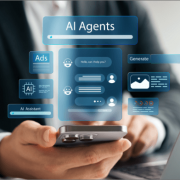Data is a valuable asset in this hyperconnected digital age; the world is producing more of it than ever before. Each day, 2.5 quadrillion bytes of data is generated by internet users alone. Data-driven intelligent automation is essential in making sense of this enormous amount of information. It helps enterprises transform data analytics and unlock new growth opportunities to stay ahead. And it helps you draw more value from your data to make profitable decisions.
If used correctly, data-driven intelligent automation enables enterprises to achieve unprecedented efficiency, speed, and results. It also enables businesses to accelerate ROI from their data and analytics investments.
What is data-driven intelligent automation?
Data-driven automation differs from process-driven automation. The latter directs automation such that it can’t veer from a predetermined direction. Humans need to intervene whenever an exception (an assigned task that doesn’t fit the established pathway) is detected.
Often described as being an initial digital transformation step, a process-driven system is limited to automating repetitive tasks. Being easy to implement and manage, it lets organizations automate simple processes within a few weeks, such that they quickly realize time and cost savings, improvements in accuracy, and efficiency gains. Thus it is widely used in delivering physical products, streamlining customer services, and managing financial resources. But process-driven automation has significant limitations.
Evolving from process-driven systems, data-driven technology is a more complex form of intelligent automation. It’s more powerful in handling intricate processes because it’s guided by both data and context.
A data-driven system combines robotic process automation (RPA) and artificial intelligence (AI) technologies that includes deep learning (DL), natural language processing (NLP), machine learning (ML), decision-making engines, and deductive and prescriptive analytics. High-quality data is central to data-driven automation because the AI learns from it to enhance processes.
A data-driven approach automates processes much quicker and more precisely than process-driven systems. It can also span multiple systems and data silos. Unlike process-driven automation, advanced AI empowers it to process unstructured data and engage neurological judgement which uses human-like, judgment-based interactions.
More importantly, a data-driven approach can automate non-repetitive processes, thus increasing the scope of automatable processes across an enterprise. It can automate tasks that previously had to be performed by humans. And it makes RPA smarter, enabling it to engage in processes that don’t follow prearranged pathways.
Why should organizations embrace data-driven automation?
Adopting data-driven intelligent automation can help businesses accelerate their ROI from data and analytics investments. It can:
- Reduce the incidence of manual errors
- Cut down on human resource spending
- Increase analytics speed
- Improve big data analysis
- Allow data scientists to generate new insights to guide business decisions
The data-driven approach simplifies and speeds up insight generation by automatically analyzing massive volumes of streaming data and quickly identifying patterns. It accelerates the data preparation process, automates report generation, and empowers users to make data-driven decisions.
Additionally, it makes it easier to share findings with multiple stakeholders across the organization. Quick access to reliable insights ensures key users can ultimately drive transformation projects and the business.
Data-driven intelligent automation offers high-value and unique use cases—from predictive analytics and customer engagement to product optimization. What follows are a few key benefits derived from its adoption.
Faster insights yields profitable decisions – Speed is a crucial differentiator in any competitive market. Real-time insights are essential for successfully launching new products or improving services. Data-driven intelligent automation can make sense of large amounts of variables and metrics pulled from multiple sources. Because the full data value chain is automated, users can access meaningful insights from raw data as it arrives, thus helping teams to take timely and profitable actions. For example, it’s particularly useful in managing marketing campaigns, insurance and financial contracts, fraud management, healthcare processes, and more.
Boost productivity – From data preparation to visualization, it can take a lot of time to manage data lifecycles. Automation can significantly reduce this effort, freeing up your data science teams to concentrate on vital issues and core business areas. It eliminates complexities related to monitoring ever-changing variables. And it makes it much easier for users to interpret data, find hidden patterns, spot minute anomalies, and uncover complex insights often missed by manual approaches.
Reduce costs – Because it reduces time spent on data preparation, analysis, and modeling, data-driven automation results in significant savings. SaaS-based platforms enable businesses to quickly scale data analytics without having to make large investments in building and managing AI capabilities in-house.
Intelligent automation by Infocepts
Data-driven systems are better at empowering businesses to take full advantage of intelligent automation. Hence new-age companies use data-driven automation to elevate customer experiences, improve processes, prevent waste and fraud in the industry.
While other modernization endeavors are ongoing, many organizations find it challenging to embrace data-driven intelligent automation within the limitations of their IT ecosystem. Infocepts can help. We design intelligent services to automate complex use cases and deliver autonomous insights to users having an immediate need. It leverages cutting-edge technologies—including AI, NLP, ML, natural language generation, computer vision, RPA, hyper automation, and low code—to deliver intelligent services that work perfectly un concert with user-driven demands.
Learn more about Infocepts data-driven intelligent automation solution and how it helps organizations reimagine their operating models and service delivery using AI and ML.
Recent Blogs

What Retail Media Can Learn from Instacart’s AI Strategy
June 24, 2025

Beyond Chatbots: How Agentic AI Is Automating High-Stakes Business Decisions
June 11, 2025

From Batch to Real-Time: The Future of Data Distribution Using Databricks Delta Sharing
June 4, 2025

Accelerating Databricks Serverless Adoption with Agentic AI & Proven Practices
May 29, 2025


